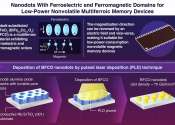Putting the squeeze on an old material could lead to 'instant on' electronic memory
(PhysOrg.com) -- The technology of storing electronic information - from old cassette tapes to shiny laptop computers - has been a major force in the electronics industry for decades.









